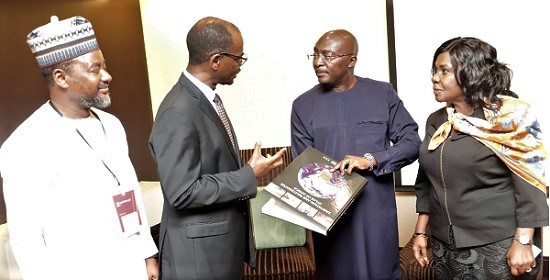
Dr Bawumia calls for strengthening of WASH initiatives in Africa
The Vice-President, Dr Mahamudu Bawumia, has called for the strengthening of water, sanitation and hygiene (WASH) initiatives in Africa for effective service delivery.
He said it was imperative to tap into the unique experiences, skills and stock of knowledge of experts to chart a new course for improved WASH activities.
Advertisement
Dr Bawumia made the call at a three-day symposium on WASH in Accra yesterday[October 19, 2022].
Known as the “All System Go Africa Symposium”, the meeting is a platform for WASH experts in Africa to brainstorm on the best ways to make the sector more responsive to the needs of the people.
The symposium, being organised by the Ministry of Sanitation and Water Resources, with support from UNICEF and the IRC, is taking place in Africa for the first time.
It is as a result of the impact made and the feedback offered by African experts and leaders who participated in the 2019 edition of the symposium in The Hague, The Netherlands.
The programme has been designed to seek tailor-made strategies capable of addressing the bottlenecks in the WASH sector on the continent.
According to Dr Bawumia, the experiences and feedback shared by African participants at The Hague provided adequate justification for the follow-up event in Accra.
Water situation
The Vice-President said out of the over half a billion people living without adequate supply of water globally, a significant proportion was found in sub-Saharan Africa.
With the current slow rate of progress, he said, some countries were not only likely to miss the 2025 WASH target but might also fail to attain the global target set for 2030.
That, he said, meant that millions of families, including children, risked being left without critical life-saving water and sanitation services, “hence the need to intensify our efforts to provide more WASH infrastructure”.
“We also acknowledge the fact that the issue for more funding will remain a major challenge to us on the continent, especially during this period when the world is faced with the socio-economic impact of COVID-19 and the Russia-Ukraine war.
“This assertion is reinforced by estimates from the African Development Bank suggesting that, currently, the African continent requires between $87 billion and $112 billion additionally to finance the execution of WASH infrastructure annually,” he added.
Commitment
On how to achieve Goal Six of the Sustainable Development Goals (SDGs), the Vice-President said as co-Chair of the SDGs, President Nana Addo Dankwa Akufo-Addo had demonstrated adequate commitment to ensure that the country met the 2030 agenda within the stipulated time.
That commitment, he said, reflected in the many projects being undertaken in the sector, some of which had been completed and inaugurated, while processes were ongoing for others.
Dr Bawumia mentioned the Upper East, Yendi, Tamale, Damongo and Wenchi as some of the areas which were benefitting from water supply projects.
The others were the Sunyani, Keta, Sekondi-Takoradi, the Greater Accra Metropolitan Area (GAMA) and the Greater Kumasi Metropolitan Area water and sanitation projects, he said.
When completed, he noted, about 4.3 million people were expected to benefit.
“According to the 2021 Population and Housing Census on water and sanitation coordinated by the Ghana Statistical Service, the percentage of households with access to basic drinking water had seen a significant improvement from 79 per cent in 2018 to 87.7 per cent in 2021.
“And the number of households that currently have access to toilet facilities has also increased from 33 to 59.3 per cent,” the Vice-President added, saying the gains had led to the country not recording any cholera cases over the past five years.
Acknowledgement
The Minister of Sanitation and Water Resources, Ms Cecilia Dapaah, said although there had been some achievements in the WASH sector on the continent, there were still gaps which needed to be filled.
“We must find new responses to the challenges by developing skills and tools, including moving from theory to the implementation of workable systems,” she added.




